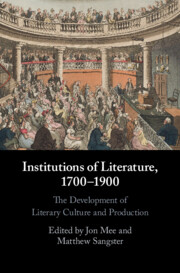Book contents
- Institutions of Literature, 1700–1900
- Institutions of Literature, 1700–1900
- Copyright page
- Contents
- Figures
- Contributors
- Acknowledgements
- Introduction Literature and Institutions
- Chapter 1 Knowledge Exchange in the Seventeenth Century
- Chapter 2 ‘Supporting Mutual Benevolence’
- Chapter 3 Institutions without Addresses
- Chapter 4 Eighteenth-Century Musenhof Courts as Bridges and Brokers for Cultural Networks and Social Reform
- Chapter 5 Becoming Institutional
- Chapter 6 Circulating Libraries as Institutional Creators of Genres
- Chapter 7 Lecturing Networks and Cultural Institutions, 1740–1830
- Chapter 8 Catalogues as Instituting Genres of the Nineteenth-Century Museum
- Chapter 9 Charles Lamb and the British Museum as an Institution of Literature
- Chapter 10 A Disruptive and Dangerous Education and the Wealth of the Nation
- Chapter 11 ‘The Ladies’ Contribution’
- Chapter 12 ‘[L]etters Must Increase’
- Chapter 13 Networks, Nodes, and Beacons
- Chapter 14 The Book as Medium
- Index
Chapter 14 - The Book as Medium
Published online by Cambridge University Press: 30 June 2022
- Institutions of Literature, 1700–1900
- Institutions of Literature, 1700–1900
- Copyright page
- Contents
- Figures
- Contributors
- Acknowledgements
- Introduction Literature and Institutions
- Chapter 1 Knowledge Exchange in the Seventeenth Century
- Chapter 2 ‘Supporting Mutual Benevolence’
- Chapter 3 Institutions without Addresses
- Chapter 4 Eighteenth-Century Musenhof Courts as Bridges and Brokers for Cultural Networks and Social Reform
- Chapter 5 Becoming Institutional
- Chapter 6 Circulating Libraries as Institutional Creators of Genres
- Chapter 7 Lecturing Networks and Cultural Institutions, 1740–1830
- Chapter 8 Catalogues as Instituting Genres of the Nineteenth-Century Museum
- Chapter 9 Charles Lamb and the British Museum as an Institution of Literature
- Chapter 10 A Disruptive and Dangerous Education and the Wealth of the Nation
- Chapter 11 ‘The Ladies’ Contribution’
- Chapter 12 ‘[L]etters Must Increase’
- Chapter 13 Networks, Nodes, and Beacons
- Chapter 14 The Book as Medium
- Index
Summary
As interest in the practices of Spiritualism in the United Kingdom grew through the nineteenth century, several attempts were made to codify the movement’s collective interests by establishing an institutional identity. This chapter examines two such attempts at formal organisation – the Spiritual Institution (1863-94) run by the publisher James Burns, and W.T. Stead’s Julia’s Bureau (1909-12), which described itself as a post office to the afterlife. Both enterprises championed formal collaboration between the living and the dead, counting spirits among their leadership. Both also emphasised the importance of a shared curriculum and encouraged members to identify as a community of readers of medium-channelled works. Examining the public claims made by the founders of these institutions and drawing upon the literature they circulated and published, this chapter demonstrates that, though claiming transparency, the records left behind deliberately obscure the day-to-day activities of those in charge. More than this, in adopting the familiar language of institutional authority Burns and Stead re-enacted at an organisational level the same sleight of hand upon which their wider Spiritualist practice relied. It is impossible from the surviving records to now deduce whether their organisations operated in good faith or engaged in deliberate fraudulence to convince the credulous of their real association with the dead.
Keywords
- Type
- Chapter
- Information
- Institutions of Literature, 1700–1900 , pp. 275 - 291Publisher: Cambridge University PressPrint publication year: 2022

